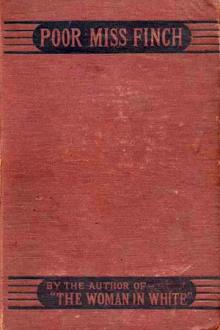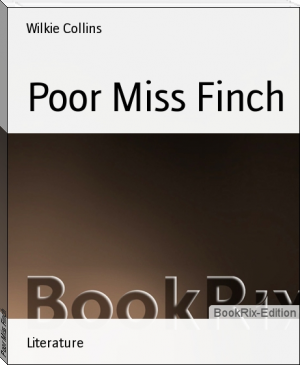Poor Miss Finch - Wilkie Collins (best books to read for beginners txt) 📗

- Author: Wilkie Collins
- Performer: -
Book online «Poor Miss Finch - Wilkie Collins (best books to read for beginners txt) 📗». Author Wilkie Collins
“Inscrutable Providence” was the rector’s fatal phrase—it always brought with it an interruption; and it brought one now. Before Mr. Finch (brimful of pathetic apostrophes) could burst into more exclamations, the door opened, and Oscar walked into the room.
Lucilla instantly recognized his footstep.
“Any signs, Oscar, of Herr Grosse?” she asked.
“Yes. His chaise has been seen on the road. He will be here directly.”
Giving that answer, and passing by my chair to place himself on the other side of Lucilla, Oscar cast at me one imploring look—a look which said plainly, “Don’t desert me when the time comes!” I nodded my head to show that I understood him and felt for him. He sat down in the vacant chair by Lucilla, and took her hand in silence. It was hard to say which of the two felt the position, at that trying moment, most painfully. I don’t think I ever saw any sight so simply and irresistibly touching as the sight of those two poor young creatures sitting hand in hand, waiting the event which was to make the happiness or the misery of their future lives.
“Have you seen anything of your brother?” I asked, putting the question in as careless a tone as my devouring anxiety would allow me to assume.
“Nugent has gone to meet Herr Grosse.”
Oscar’s eyes once more encountered mine, as he replied in those terms; I saw again the imploring look more marked in them than ever. It was plain to him, as it was plain to me, that Nugent had gone to meet the German, with the purpose of making Herr Grosse the innocent means of bringing him into the house.
Before I could speak again, Mr. Finch, recovering himself after the interruption which had silenced him, saw his opportunity of setting in for another harangue. Mrs. Finch had left off sobbing; the baby had left off screaming; the rest of us were silent and nervous. In a word, Mr. Finch’s domestic congregation was entirely at Mr. Finch’s mercy. He strutted up to Oscar’s chair. Was he going to propose to read Hamlet? No! He was going to invoke a blessing on Oscar’s head.
“On this interesting occasion,” began the rector in his pulpit tones; “now that we are all united in the same room, all animated by the same hope—I could wish, as pastor and parent (God bless you, Oscar: I look on you as a son. Mrs. Finch, follow my example, look on him as a son!)—I could wish, as pastor and parent, to say a few pious and consoling words–-”
The door—the friendly, admirable, judicious door—stopped the coming sermon, in the nick of time, by opening again. Herr Grosse’s squat figure and owlish spectacles appeared on the threshold. And behind him (exactly as I had anticipated) stood Nugent Dubourg.
Lucilla turned deadly pale: she had heard the door open, she knew by instinct that the surgeon had come. Oscar got up, stole behind my chair, and whispered to me, “For God’s sake, get Nugent out of the room!” I gave him a reassuring squeeze of the hand, and, putting Jicks down on the floor, rose to welcome our good Grosse.
The child, as it happened, was beforehand with me. She and the illustrious oculist had met in the garden at one of the German’s professional visits to Lucilla, and had taken an amazing fancy to each other. Herr Grosse never afterwards appeared at the rectory without some unwholesome eatable thing in his pocket for Jicks; who gave him in return as many kisses as he might ask for, and further distinguished him as the only living creature whom she permitted to nurse the disreputable doll. Grasping this same doll now, with both hands, and using it head-foremost, as a kind of battering-ram, Jicks plunged in front of me, and butted with all her might at the surgeon’s bandy legs; insisting on a monopoly of his attention before he presumed to speak to any other person in the room. While he was lifting her to a level with his face, and talking to her in his wonderful broken English—while the rector and Mrs. Finch were making the necessary apologies for the child’s conduct—Nugent came round from behind Herr Grosse, and drew me mysteriously into a corner of the room. As I followed him, I saw the silent torture of anxiety expressed in Oscar’s face as he stood by Lucilla’s chair. It did me good; it strung up my resolution to the right pitch; it made me feel myself a match, and more than a match, for Nugent Dubourg.
“I am afraid I behaved in a very odd manner, when we met in the village?” he said. “The fact is, I am not at all well. I have been in a strange feverish state lately. I don’t think the air of this place suits me.” There he stopped; keeping his eyes steadily fixed on mine, trying to read my mind in my face.
“I am not surprised to hear you say that,” I answered. “I have noticed that you have not been looking well lately.”
My tone and manner (otherwise perfectly composed) expressed polite sympathy—and nothing more. I saw I puzzled him. He tried again.
“I hope I didn’t say or do anything rude?” he went on.
“Oh, no!”
“I was excited—painfully excited. You are too kind to admit it; I am sure I owe you my apologies?”
“No, indeed! you were certainly excited, as you say. But we are all in the same state to-day. The occasion, Mr. Nugent, is your sufficient apology.”
Not the slightest sign in my face of any sort of suspicion of him rewarded the close and continued scrutiny with which he regarded me. I saw in his perplexed expression, the certain assurance that I was beating him at his own weapons. He made a last effort to entrap me into revealing that I suspected his secret—he attempted, by irritating my quick temper, to take me by surprise.
“You are no doubt astonished at seeing me here,” he resumed. “I have not forgotten that I promised to remain at Browndown instead of coming to the rectory. Don’t be angry with me: I am under medical orders which forbid me to keep my promise.”
“I don’t understand you,” I said just as coolly as ever.
“I will explain myself,” he rejoined. “You remember that we long since took Grosse into our confidence, on the subject of Oscar’s position towards Lucilla?”
“I am not likely to have forgotten it,” I answered, “considering that it was I who first warned your brother that Herr Grosse might do terrible mischief by innocently letting out the truth.”
“Do you recollect how Grosse took the warning when we gave it to him?”
“Perfectly. He promised to be careful. But, at the same time, he gruffly forbade us to involve him in any more of our family troubles. He said he was determined to preserve his professional freedom of action, without being hampered by domestic difficulties which might concern us, but which did not concern him. Is my memory accurate enough to satisfy you?”
“Your memory is wonderful. You will now understand me when I tell you that Grosse asserts his professional freedom of action on this occasion. I had it from his own lips on our way here. He considers it very important that Lucilla should not be frightened at the moment when she tries her sight. Oscar’s face is sure to startle her, if it is the first face she sees. Grosse has accordingly requested me to be present (as the only other young man in the room), and to place myself so that I shall be the first person who attracts her notice. Ask him yourself, Madame Pratolungo, if you don’t believe me.”
“Of course I believe you!” I answered. “It is useless to dispute the surgeon’s orders at such a time as this.”
With that, I left him; showing just as much annoyance as an unsuspecting woman, in my position, might have naturally betrayed—and no more. Knowing, as I did, what was going on under the surface, I understood only too plainly what had happened. Nugent had caught at the opportunity which the surgeon had innocently offered to him, as a means of misleading Lucilla at the moment, and (possibly) of taking some base advantage of her afterwards. I trembled inwardly with rage and fear, as I turned my back on him. Our one chance was to make sure of his absence, at the critical moment—and, cudgel my brains as I might, how to reach that end successfully was more than I could see.
When I returned to the other persons in the room, Oscar and Lucilla were still occupying the same positions. Mr. Finch had presented himself (at full length) to Herr Grosse. And Jicks was established on a stool in a corner: devouring a rampant horse, carved in bilious-yellow German gingerbread, with a voracious relish wonderful and terrible to see.
“Ah, my goot Madame Pratolungo!” said Herr Grosse, stopping on his way to Lucilla to shake hands with me. “Have you made anodder lofely Mayonnaise? I have come on purpose with an empty-stomachs, and a wolf’s-appetite in fine order. Look at that little Imps,” he went on, pointing to Jicks. “Ach Gott! I believe I am in lofe with her. I have sent all the ways to Germany for gingerbreads for Jick. Aha, you Jick! does it stick in your tooths? Is it nice-clammy-sweet?” He glared benevolently at the child through his spectacles; and tucked my hand sentimentally into the breast of his waistcoat. “Promise me a child like adorable Jick,” he said solemnly, “I will marry the first wife you bring me—nice womans, nasty womans, I don’t care which. Soh! there is my domestic sentiments laid bare before you. Enough of that. Now for my pretty-Feench! Come-begin-begin!”
He crossed the room to Lucilla, and called to Nugent to follow him.
“Open the shutters,” he said. “Light-light-light, and plenty of him, for my lofely Feench!”
Nugent opened the shutters, beginning with the lower window, and ending with the window at which Lucilla was sitting. Acting on this plan, he had only to wait where he was, to place himself close by her—to be the first object she saw. He did it. The villain did it. I stepped forward, determined to interfere—and stopped, not knowing what to say or do. I could have beaten my own stupid brains out against the wall. There stood Nugent right before her, as the surgeon turned his





Comments (0)